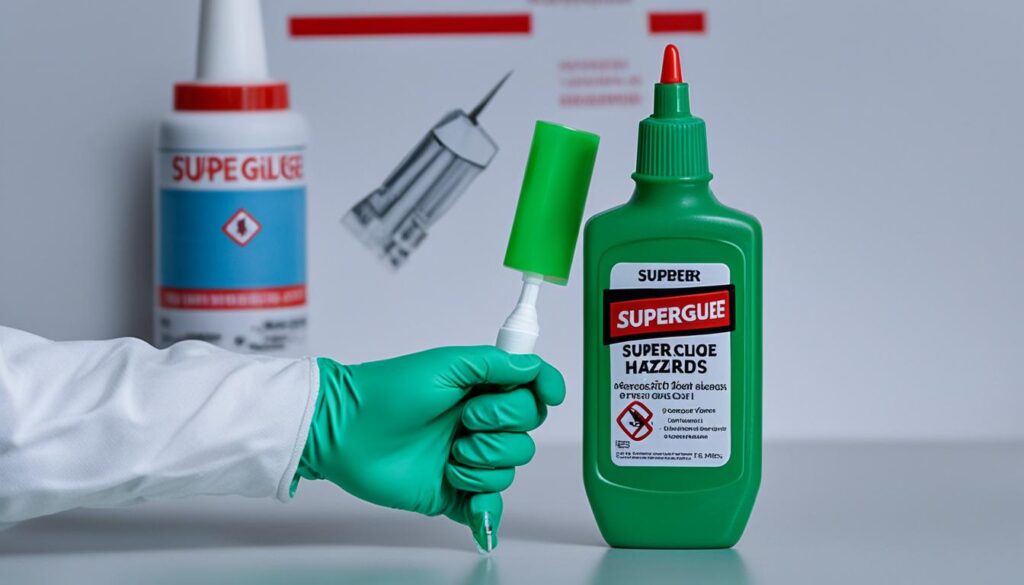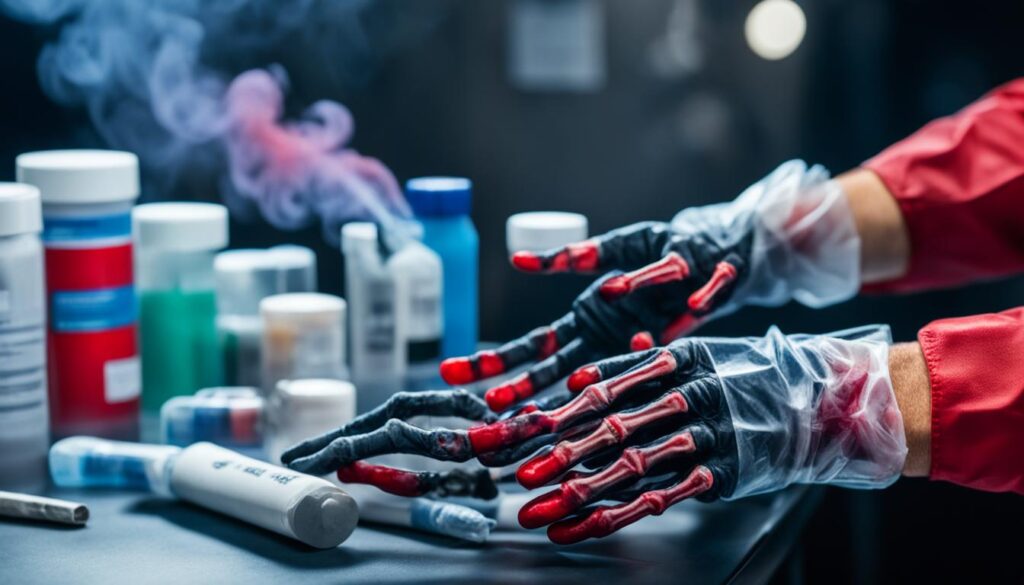
Understanding the Risks of Superglue Use
Superglue is a widely used adhesive that provides quick and strong bonding. However, it’s important to be aware of the potential risks associated with its use. By understanding these risks, you can take necessary precautions to ensure your safety.
Key Takeaways:
- Superglue has health hazards that can result from exposure, including skin irritation and toxicity concerns.
- To use superglue safely, it’s crucial to minimize skin contact and avoid inhaling fumes.
- Proper ventilation and protective measures, such as gloves and eye protection, should be taken when working with superglue.
- Awareness of the specific chemicals in superglue that can pose health risks is essential for making informed decisions and protecting your well-being.
- By following safety guidelines and adopting proper storage practices, you can mitigate the risks associated with superglue use.
Superglue Hazards and Safety Precautions
When using superglue, it is important to be aware of the potential hazards and take necessary precautions to ensure your safety. While superglue is a convenient adhesive, it can pose risks if not handled properly. In this section, we will explore the specific hazards associated with superglue and provide valuable tips for using it safely.
Is Superglue Toxic?
Superglue contains chemicals known as cyanoacrylates, which can be potentially harmful if ingested or exposed to the skin for prolonged periods. While not highly toxic, it is important to avoid unnecessary contact or ingestion of superglue to prevent any adverse effects.

Potential Harm from Superglue
Misusing superglue can result in various adverse effects on your health. One common side effect is skin irritation, which may manifest as redness, itching, or a rash. It is crucial to prevent direct contact with the skin, especially sensitive areas, and to be cautious when applying superglue to avoid accidental spills or splashes.
Using Superglue Safely
To minimize the risks associated with superglue, follow these safety precautions:
- Use superglue in a well-ventilated area to avoid inhaling fumes.
- Wear gloves and protective eyewear to prevent skin contact and eye irritation.
- Ensure the workspace is clean and free from any flammable materials to avoid accidents.
- Do not ingest superglue or use it on open wounds.
- Avoid using superglue near your mouth or nose.
Superglue Precautions
“Safety should always be a priority when using superglue. By following the necessary precautions, you can minimize the potential harm and enjoy the benefits of this adhesive.”
Remember, prevention is key when it comes to using superglue safely. By being mindful of the hazards and taking appropriate precautions, you can effectively minimize any potential risks and ensure a safe and successful application of superglue.
Understanding Superglue Toxicity Concerns
In this section, we will explore the specific chemicals present in superglue that can pose health risks and discuss the potential consequences of prolonged exposure. By understanding superglue toxicity concerns, you can make informed decisions about using superglue and take appropriate measures to protect your health.

Superglue contains toxic chemicals that can have adverse effects on human health. The main ingredient in superglue is cyanoacrylate, a fast-acting adhesive with strong bond-forming properties. While cyanoacrylate is generally safe to use, prolonged exposure or misuse can lead to various health risks.
One of the primary concerns associated with superglue toxicity is skin irritation. When applied to the skin, superglue can cause irritation, redness, and even chemical burns if left on for a prolonged duration. It is essential to handle superglue with care and avoid direct contact with the skin to minimize the risk of irritation.
Additive chemicals present in some superglue formulations can further contribute to the toxicity concerns. These additives may include plasticizers, stabilizers, and solvents that can release harmful fumes and vapors. Prolonged inhalation of these fumes can lead to respiratory irritation, dizziness, and even organ damage in severe cases.
To safeguard your health when using superglue, it is crucial to follow safety precautions:
- Always use superglue in a well-ventilated area to minimize inhalation of harmful fumes.
- Wear gloves or use a barrier cream to prevent direct contact with the skin.
- Avoid using superglue on broken or irritated skin.
- If skin contact occurs, wash the area thoroughly with soap and water.
- In case of accidental ingestion or severe symptoms, seek medical assistance immediately.
By being aware of the potential toxicity of superglue and taking necessary precautions, you can minimize the health risks associated with its use. It is important to prioritize your safety and well-being when handling any potentially hazardous substances.
Conclusion
In conclusion, it is important to recognize the risks associated with the use of superglue. While superglue is a versatile adhesive that can be incredibly useful in various applications, improper handling or misuse can lead to potential hazards.
By following safety guidelines and using superglue responsibly, you can minimize these risks and ensure safe usage. It is crucial to exercise caution when working with superglue, particularly when it comes to skin contact and inhalation of fumes.
Throughout this article, we have highlighted the potential dangers of superglue, including risks like skin irritation and toxicity concerns. By understanding these hazards, you can take appropriate measures to protect yourself and others, allowing you to confidently use superglue while minimizing potential harm.




